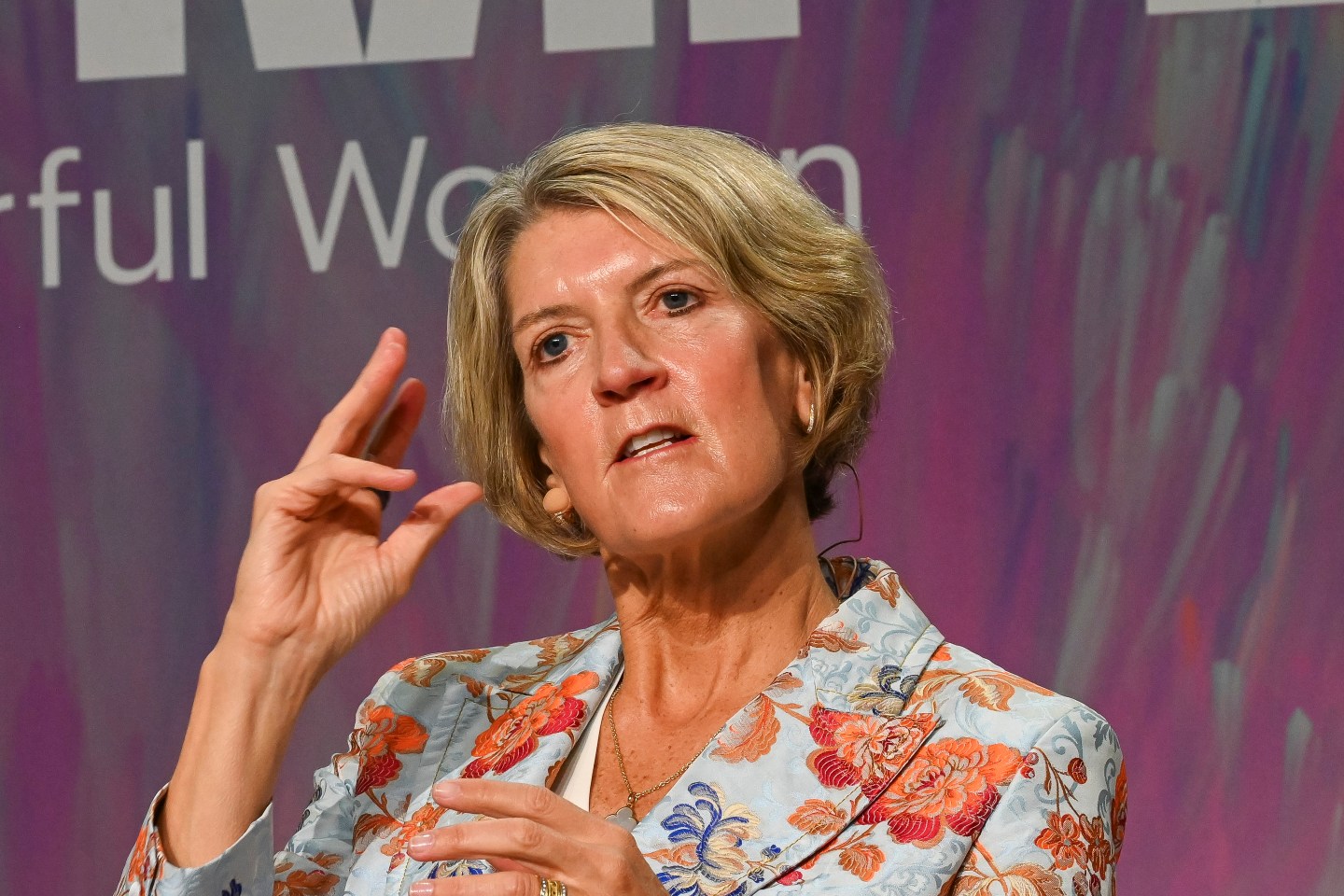’Tis the season for Sarah Casalan.
“I’ll be working in our stores tomorrow and then out visiting stores on Wednesday,” the president of The UPS Store tells me from Chicago the Monday before Christmas. “Why go at the end of the season versus the beginning of the season? Because your customers aren’t as holly-jolly happy this week as they were maybe last week.”
Casalan, who joined UPS in 2021 and oversees some 5,300 franchise locations, is no stranger to building trust with customers.
“I come from customer-obsessed brands,” says the veteran retail exec, who previously served as a VP at Crate and Barrel, J.Crew, and Club Monaco.
How has that translated? “We’ve really doubled down on…the voice of the customer and listening every day and then taking that feedback and applying it,” Casalan says. “And enabling and empowering our franchisees with that visibility into how they can impact their customer experience.”
Although many customers begin their journey online, they often finish in-store. In fact, every year, people make 700 million trips to The UPS Store, Casalan notes. “There’s not a lot of reason for you to walk into a store anymore,” she says. “So when you’re coming in, there’s a lot of life, there’s a lot of meaning in each and every one of those trips.”
The UPS Store, which offers shipping, postal, print, and business services, is a needs-based operation, Casalan observes. Someone might come in for notary service to buy a home, to rent a mailbox as their first step in launching a small business—or, at this time of year, to send gifts to a new grandchild they haven’t met.
“We want to make sure that our say-do ratio is so high, that we are consistently approaching those transactions with a great deal of care and expertise, and that we’re going to fulfill on the promise that we’ve made to you as a premium service,” Casalan says.
To that end, The UPS Store has made customer listening tools and dashboards available to its franchisees. By drawing on that real-time feedback, they can follow up with detractors and potentially turn them into promoters, Casalan says.
That approach appears to be working. Over the past three years, Casalan says, customer satisfaction scores have improved every quarter.
But in her view, the most impactful change was rethinking how to support franchisees in the field. “We have historically been very concerned with compliance and imaging and all of the things that are very important for brand standards,” Casalan says. “But we’ve added in a new layer, and that layer supersedes everything, which is the commitment to the customer.”
As part of that shift, The UPS Store has reoriented its field team to provide support focused on the customer experience. As for the corporate team, it used to be called HQ but is now known as the solution and support campus.

Change is one thing, but when it comes to trust, Casalan is also mindful that The UPS Store has been around since 1980. Franchisees typically live where they operate, giving them a stake in the community, and customers feel a sense of ownership.
“I truly think we could probably change the name of the brand to My UPS Store and we wouldn’t miss a beat, because that’s how customers refer to it.”
During the holiday season, Casalan and her team hear stories of customers bringing treats to their local UPS Store. “To have that level of emotional connection across our customers really speaks to, again, that 44-year-old legacy of providing essential services for our customers, creating value, doing it with expertise and care.”
Those clients include small-business owners whose mailbox is their street address, Casalan says. “We love to think of ourselves as an extension of our small-business owners in their communities, but also the facilitators, to some degree, of their goals and objectives.”
For Casalan, who describes herself as an old-school retailer, building trust comes back to looking after the customer—not just during a transaction but after it, too.
“We retailers get really focused on the promotional schedule, we get focused on the operational efficiencies in the store,” she says. “But I believe that if we follow the customer and we maintain that relevancy and drive that experience, the success is going to follow.”
Handled with care.
This is the final issue of The Trust Factor, which it’s been my privilege to write each week for almost a year. A big thank-you to all the executives and other experts who shared their insights into trust—and to their comms folks for making those interviews happen. My editor, Hillary Hoffower, and her fellow editors deserve a shout-out, too.
Finally, heartfelt thanks to everyone who took time to read The Trust Factor, share feedback, and offer support.
Happy Holidays, and I wish you and yours all the best in 2025!
Nick Rockel
nick.rockel@consultant.fortune.com
IN OTHER NEWS
Tech support
Mark Zuckerberg, Tim Cook, Sam Altman, Jeff Bezos—tech moguls are falling over themselves to win Donald Trump’s trust. What gives? The fast-approaching Trump administration seems keener than Joe Biden’s to hear about what matters to the tech sector, Salesforce CEO Marc Benioff said. Benioff’s industry has much to gain from flattering and effectively bribing the president-elect: free rein for AI development, more energy for data centers, and an ally against the EU’s crackdown on Big Tech. Besides, for our real overlords, what’s a $1 million donation to Trump’s inaugural fund?
Age gap
Trust workers over 40: Ageism is a thing. In a survey of 1,000 professionals, 99% said it exists at their organization, Brit Morse writes. About 80% of respondents believe age-related stereotypes are a problem and that older employees often get bullied. As a result, more than 90% said they’ve felt pressure to hide their age or downplay their experience to avoid being perceived negatively at work. On top of that, older workers hesitate to report such discrimination because they can’t trust HR and worry the problem won’t get fixed. It could take ages.
Nuclear option
It’s an underground sensation. Sales of private nuclear bunkers are climbing worldwide against the backdrop of a surge in arms spending. News flash for those customers: Atomic blasts don’t tend to be survivable. And FEMA says such shelters are unnecessary, given that simply spending a day indoors can shield against radioactive fallout. None of that is likely to deter buyers, who are trusting bunkers to protect their families from terrorist attacks and civil unrest too. One forecast sees the U.S. bomb and fallout shelter market growing to $175 million by 2030—an almost 30% gain from last year. Good times.
Feeling judgy
Americans across the political spectrum keep losing trust in the rule of law. Their confidence in the judicial system and the courts hit a record low of 35% in 2024, a Gallup poll shows. That trust has plunged 24% over the past four years, putting the U.S. in the company of Myanmar, Syria, and Venezuela. Such a slide might have something to do with the Supreme Court overturning the national right to abortion, Donald Trump getting indicted only to have federal charges against him dropped, and Trump’s attacks on the judiciary. Whatever the reason, the law isn’t winning.
TRUST EXERCISE
“Unprecedented developments make it feel as if 2025 is hurtling toward us at ludicrous velocity, requiring leaders to seize new expertise needed for digital transformation.
Change and control are two forces that shape our lives but rarely align. Change drives progress and growth—it’s relentless and disruptive. Control represents efforts to manage advancements and create order within chaos.
Balancing these two forces often determines if we thrive or merely survive. Alarmingly, countless corporate cultures, leaders, and advisers are woefully unprepared for the relentless, warp-speed surge of cyber and digital attacks, now turbocharged by artificial intelligence (AI). Furthermore, operational mistakes are amplified on the internet, leaving many blindsided or paralyzed, unable to mount an effective public response.”
Two hours. That’s how long it takes for AI to ruin a good day, Richard Torrenzano notes. The CEO of The Torrenzano Group gives the example of Google’s Bard AI (now called Gemini) making a false claim during a public demonstration last year.
After that flub instantly went viral, Google parent Alphabet lost $100 billion in market value. Management poured fuel on the fire by failing to quickly and transparently address the mistake.
Trust is the cornerstone of crisis management when the two-hour clock is ticking, Torrenzano says. By swiftly, clearly, and consistently communicating, a company can put stakeholders at ease and show that leadership can take the heat. To fight AI-powered threats like deepfakes and ransomware, Torrenzano also calls on businesses to build digital response teams led by a C-suite news chief. In today’s world, doing anything less could be a quick route to disaster.












